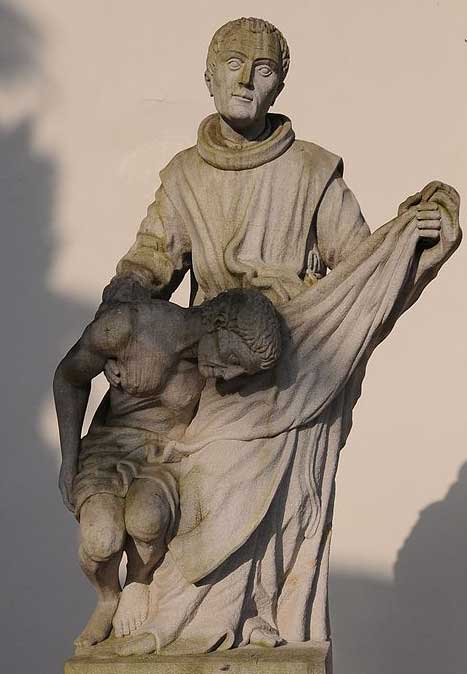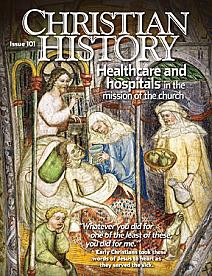HOW GOD USED A HALF-MAD RUNAWAY TO BECOME A HERO TO THE DOWNTRODDEN

[Above: Statue of Saint John of God in Vilar de Frades, Barcelos, Portugal—Joseolgon / [CC-BY-SA 3.0 Unported] Wikimedia File:Sao Joao de Deus.JPG]
NO ONE KNOWS WHY eight-year-old John Duarte Cidade followed a priest from Portugal to Orepeza, Spain (near Toledo). In Orepeza, kindly Francisco Mayoral took in the starving boy and employed him as a shepherd. John, who had been born on this day, 8 March 1495, in Montemor Novo, spent long days in meditation. In his early twenties he joined the forces of the Count of Oropesa, abandoned his morals, and nearly lost his life when dispatched against the French at Fontarabia. This was not through military engagement, but because of dereliction of duty, for he permitted the theft of loot he was supposed to be guarding. When he was about to be hanged, a passing officer obtained his release. John returned to shepherding.
Four years later, he rejoined the army and served throughout Europe for eighteen years. He was among Emperor Charles V’s forces when they repelled the Turkish invasion that reached the walls of Vienna. Leaving the military life, he finally returned to his hometown in Portugal. There he learned that his mother had died of a broken heart shortly after his disappearance, and his father, left alone, had joined a monastery where he died. With nothing in Portugal to hold him, John returned to Spain in deep remorse at the pain he had caused his parents.
Again he became a shepherd, this time near Seville. Now he no longer looked after sheep alone, but began to assist the poor around him. As his biographer Francisco de Castro related, “When he sadly remembered how well fed, protected and healthy the horses in the Count of Oropesa’s stables were, whilst the poor were so badly off, ragged and hungry, he said to himself: ‘John, would it not be better if you learned how to feed and care for the poor people of Jesus Christ rather than farm animals?’“
He became concerned for Christians held as slaves in Africa and sailed there to see if he could be of some help. Thrown into the company of a Portuguese noble exiled for a crime, he hired himself out to feed the man and his family who were sick. He labored on fortifications to earn a pittance. Conditions were so cruel and so close to slavery that he had to leave Africa lest he be tempted to flee into Moorish territory where he would have to abandon his Christian faith.
Back in Spain, he confessed his sins and dedicated his life to Christ. To support himself he became a traveling bookseller, disseminating religious books and pictures at minimal markup. Eventually he set up shop in Grenada. There he heard John of Avila preach, was convicted of his previous wrongdoing, and behaved so like a madman that he was actually incarcerated in an insane asylum.
Touched by the sufferings of the insane, he determined to care for them, and began cleaning their wards, comforting them at their bedsides, and praying with them. Upon his release he commenced the work for which he became known as John of God.
For thirteen years he worked himself to the bone caring for the sick, the insane, and repentant prostitutes. By day he gathered wood, carried the sick to his hospital, nursed them, hauled water, and did all he could to relieve their sufferings. Many repented of sins and died at peace with God. In the evenings he begged. At night he prostrated himself in prayer. Many miracles were reported of him. The chaplain of his hospital, Francisco de Castro, appealed to common knowledge to confirm those that he retold. John kept up his strenuous labors until his body was emaciated and his strength almost gone.
Still, to the very end no one applied to him in vain for help. Some took advantage of his trust and tender-heartedness, but he said they would have to answer for it to God. Helpers joined him. Two of the most famous had been bitter enemies: Antonio Martin and Pedro “Pecador” Velasco. Converted and forgiving each other, they became John’s assistants and were among those who founded the Brothers Hospitallers of St. John of God after John’s death.
That death came about because he plunged into a swollen river to rescue a boy. He failed to save the lad but caught pneumonia from exposure. He wished to die among his patients, but a wealthy patroness obtained a command from an archbishop that John go to her house for care. Even her ministrations could not save his worn body. He died on this, his birthday, 8 March 1550, just fifty-five years old. His funeral rivaled that of monarchs. On 1 January 1571 Pope Pius V endorsed the Hospitaller Order, defining their dress and placing them under the same religious rule as the Augustinians.
—Dan Graves
----- ----- -----
Learn more about the Christian mission to care for the sick in Christian History #101, Healthcare and Hospitals in the Mission of the Church






